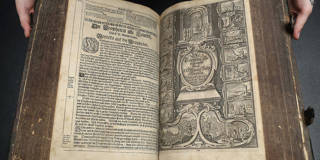 Sean Gallup/Getty Images
Sean Gallup/Getty Images
从马丁·路德身上学习科技破坏性的意义
发自日内瓦——五百年前的这个星期,一位不知名的牧师和大学神学讲师做了一件在他那个时代看来稀松平常的事情:他钉了张请愿书在门口,要求就天主教会销售“赎罪券”——此券承诺可以减少买家或亲友死后在炼狱里受折磨的时间——的做法进行学术辩论。
今天,马丁·路德发表在德国维滕贝格城堡教堂的“九十五条论纲”(他同时也发了一份给自己的顶头上司勃兰登堡红衣主教)被广泛认为是引发新教改革的火花。仅仅一年时间,路德已经跃升为欧洲最知名的人物之一,他的想法不仅挑战了教会的所作所为和教皇的权威,还最终质疑了人与上帝的关系,并以一系列今时今日依然能被人感知到的方式来开始重新配置权力和身份定义体制。
那么是什么令路德的行为变得如此意义重大?毕竟改革教会的呼声已经绵延了几个世纪。正如历史学家戴尔梅德·麦考洛(Diarmaid MacCulloch)在《基督教史:前三千年》一书中写道:在路德之前那两个世纪中也不乏在哲学,神学和政治事务上对教皇无上权威地位的挑战。那凭什么一个来自萨克森的小神学家的思想能引发广泛的宗教和政治动荡?
https://prosyn.org/FER7VjBzh
To continue reading, register now. It’s free!
Register Now
Already have an account?
Log in



发自日内瓦——五百年前的这个星期,一位不知名的牧师和大学神学讲师做了一件在他那个时代看来稀松平常的事情:他钉了张请愿书在门口,要求就天主教会销售“赎罪券”——此券承诺可以减少买家或亲友死后在炼狱里受折磨的时间——的做法进行学术辩论。
今天,马丁·路德发表在德国维滕贝格城堡教堂的“九十五条论纲”(他同时也发了一份给自己的顶头上司勃兰登堡红衣主教)被广泛认为是引发新教改革的火花。仅仅一年时间,路德已经跃升为欧洲最知名的人物之一,他的想法不仅挑战了教会的所作所为和教皇的权威,还最终质疑了人与上帝的关系,并以一系列今时今日依然能被人感知到的方式来开始重新配置权力和身份定义体制。
那么是什么令路德的行为变得如此意义重大?毕竟改革教会的呼声已经绵延了几个世纪。正如历史学家戴尔梅德·麦考洛(Diarmaid MacCulloch)在《基督教史:前三千年》一书中写道:在路德之前那两个世纪中也不乏在哲学,神学和政治事务上对教皇无上权威地位的挑战。那凭什么一个来自萨克森的小神学家的思想能引发广泛的宗教和政治动荡?